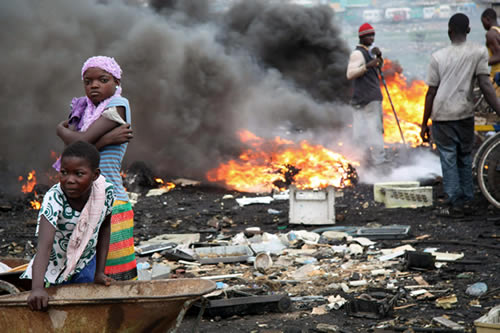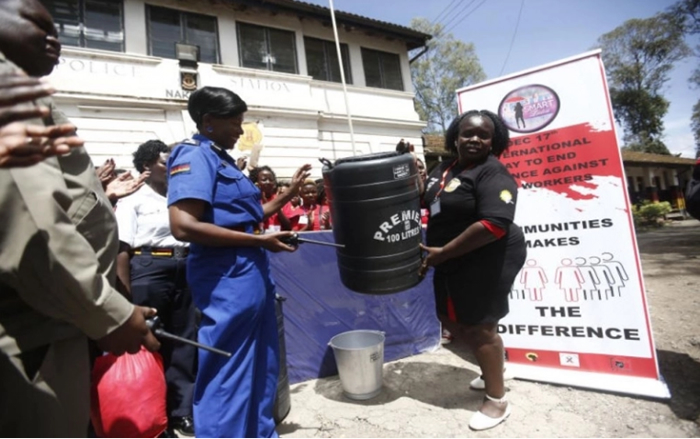Breathing To Death
- Home
- Breathing To Death

Breathing To Death

Stephen Mends, a security officer with one of the utility companies, is counting his days. This is not because of he being on a death roll, or a doctor numbering his days from a terminal illness.
It is rather due to the daily inhalation of a cocktail of plume dark smoke emanating from open burning activities close to his duty post.
Located at Cable and Wireless, a land larger than five standard football fields in the heart of Bubuashie and Darkuman of the Okaikwei South sub-metro of the Greater Accra Region, Mends’ duty post accommodates a plethora of activities on that dreaded property.
These include the burning of electrical and electronic parts by scrap dealers in order to recover metals like copper. Some waste materials, for example plastics, are also burnt.
Stephen (not his real name), whose sclera (white part of the eye) looks discoloured, complains of regular eye itch and flu.
This is plausible given that the white and blue paint on the wall of his workplace has a layer of dark soot, just like the majority of the walls in that neighborhood.
“This is troubling for my health. My superior knows about the situation and has complained to the powers that be,” he tells the Ghana News Agency (GNA).
Madam Comfort Anda, a widow who lives about 20 meters from Stephen’s job station, is thinking about moving as soon as possible because the open burning of materials that permeates her rooms, all night, is inimical to her health.
“I earn GHS 20 a day (USD1.9) and spend 70 per cent of it on buying flu-related medication for the four of us… It could have been more if not for the National Health Insurance Scheme,” the mother of three told the GNA.
A number of residents interviewed corroborated the difficult situation. However they were hesitant to speak up for fear of becoming targets of assault.
Nearly 97 per cent of the process of managing electronic waste in Ghana is done informally, resulting in the release of pollutants to contaminate soil, air and groundwater, Dr Vincent Nartey Kyere, an E-waste Expert at the Ministry of Environment, Science, Technology and Innovation, says.
The health and economic burden on Stephen and Comfort is just a representation of the silent health crisis. Many innocent people are inhaling the toxic air that emanate from the stroke of a lighter that raze through different waste materials.
Mr Mohamed Mooda, the Chairman of Darkuman Neighbourhood Committee, is worried that many residents, especially head potters (kayayie) sleep in the open at the mercy of polluted air.
“The level of education of residents is low and they do not understand the impact of breathing toxic air. They often do not seek medical care until their health condition becomes severe. They resort to self-treatment by buying drugs from chemical shops around,” he said.
Stephen’s fear of short life span might not be an illusion but potentially real.
“The continuous exposure to the polluted air of that magnitude is likely to affect all the organs, especially compromising the lung functions,” Dr Raphael K.S. Tufuor, a Medical Doctor at the Faith Clinic tells the GNA.
His clinic, which is located about 300 meters from Cable and Wireless, attends to an average of about 50 patients every week with respiratory diseases.
“There is no day I do not receive patients with respiratory tract infection. Sometimes they come in not with respiratory distress but further investigation shows that their condition is caused by bad air,” Dr Tufuor said.
For him, the health burden on patients is ‘biting’ because aside from the consultation fee, which is paid for by the National Health Insurance Authority, services including x-rays are funded by the individual.
“Sometimes, when we admit them and they feel they cannot foot the bills they abscond when their condition becomes stable,” he said.
Going by the unconfirmed figures from the hospital, about 1,000 patients in just a month show up at that health facility with respiratory tract infections.
The number of cases from Dr Tufour seems to validate the data obtained by the GNA that the country’s insurance scheme spent US$14,976,000 annually on the treatment of conditions related to non-communicable diseases among 500 patients hospitalised.
Many have been served with medical short-medium-and-long term diseases, including stroke, chronic obstructive pulmonary disease, trachea, bronchus and lung cancers, aggravated asthma and lower respiratory infections.
Statistics from the Ghana Health Service (GHS) for the first half of 2023 show that asthma, a condition mostly caused by poor air quality, was the second most non-communicable disease (NCDs) recorded.
Dr Efua Commeh, the Acting Programme Manager for Non-Communicable Diseases, GHS, explains that the data meant more people were getting sick with chronic obstructive pulmonary diseases such as asthma.
One of the biggest environmental problems the world face today is outdoor air pollution, with open burning being one of the causes, says Earth Org, a development oriented organisation that champions a healthy, happy and thriving planet.
Not only that but more than 28,000 people die in Ghana from exposure to air pollution every year (WHO 2020). This number is projected to increase if no action is taken to tackle the issue.
Globally WHO estimates that 4.2 to 7 million people die from air pollution every year and that nine out of 10 people breathe air containing high levels of pollutants.
In Africa, 258,000 people died as a result of outdoor air pollution in 2017, up from 164,000 in 1990, according to UNICEF.
Open burning by either individuals or unauthorised groups in Ghana is against the Public Health Act 2021 (ACT 851), the Local Governance Act, 2016 (ACT 936) and the Accra Metropolitan Assembly (AMA) bye-law (2017).
Under the 2017 Sanitation bye-law of the AMA for instance, a person commits an offence when found to be engaging in open burning and likely to pay a penalty of not less than 100 penalty units (not less than GHS 1,000/USD 100) when found guilty and not more than 150 penalty units, or sentenced to prison between three to six months or both.
Madam Florence S. Kuukyi, the Director, Metro Public Health Department, AMA, tells the GNA that although there was no air quality sensor at Cable and Wireless the activities pollute the air, making the quality of air poor.
She says officers have visited the place to serve perpetuators with several abatement notices.
“So far, the activities still go on and nothing has changed. We have applied for summons from the sanitation court. Upon receipt, the offenders will be served, arrest effected and processed for court,” she assured.
Access to clean air is a fundamental human right of everyone, hence, anything short of that becomes an abuse of rights, says Mr Solomon Oppong, a Human Rights Activist.
Solomon, who is also an opinion leader, accuses state institutions, including the AMA, for reneging on their responsibilities and allowing an illegality to fester for a long time.
Until the pending action by AMA to stop the activities at the Cable and Wireless receives the utmost priority, the health of Stephen and the many other residents, especially head potters sleeping in open spaces, would be jeopardised. They will, then, have to breathe to death.
Source: GNA
Classic Ghana
Classic Ghana brings you into a fun world of arts, entertainment, fashion, beauty, photography, culture and all things in between. Let’s explore these together!


